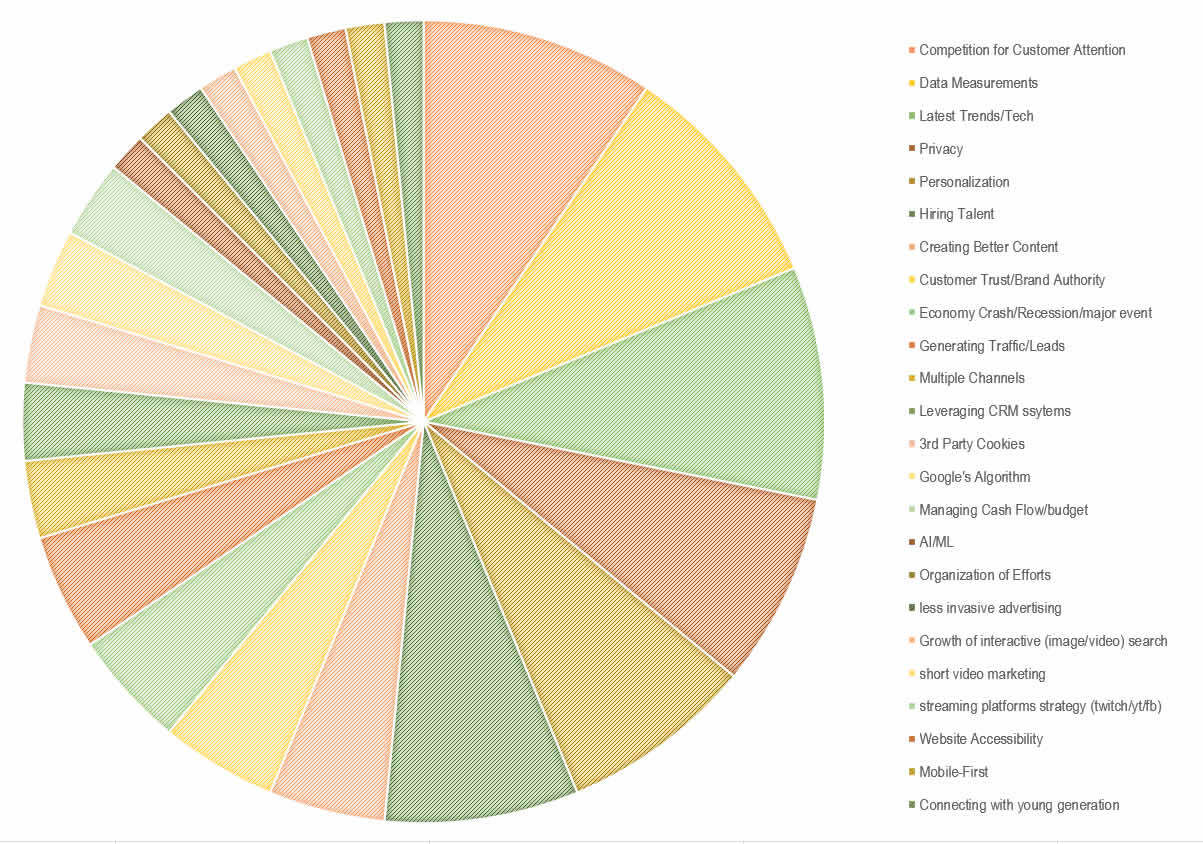
Top Challenges Marketers Are Facing
What are the top challenges marketers are facing (in 2023)?
We analyzed the top 10 google search result pages (SERPs) and ChatGPT Pro version to compile the top challenges marketers are dealing with in 2023. And you’d actually be surprised at just how bad Google’s search engine algorithm is (even in 2023 with Artificial Intelligence all the rage) as a lot of the results actually copy each other’s answers but their articles still manage to rank in the top 10 results.
Our approach to building the list.
The approach was two fold. First, we asked ChatGPT (paid version) what it though the top issues where plaguing marketers. And then we asked it again (to re-formulate it’s answer). Second, we google’d the phrase “top marketing challenges in/of 2023” and cataloged those results. We then took the list from each website and coded the answers (if needed). E.g. if the item was “Measuring the effectiveness of marketing efforts,” we would count that as a point for analytics, KPIs, and data-driven strategy. Coding each list was necessary because one list might state “tomato,” when another states “to-ma-to.” They’re both talking about the same thing, but referencing it with different descriptors. After coding was complete, we tallied the number of references across all the lists to create an ultimate list in which we’ve shared below.
The downfall of Google search.
I mentioned it before, our easy-to-duplicate approach showed that a lot of the lists actually copied entries from each other, making it almost impossible to determine who the originating authors were. And we’re not talking “tomato” vs. “to-ma-to.” No, we mean word-for-word copies. E.g. “Leveraging my CRM to its fullest potential” vs. “Leveraging CRM to its fullest potential,” something the #3 search result and the #7 page shared in their list. Yet, regardless of the plagiarism by one of the pages on the other, these all came in the top 10 results. And after all these years of SEOs hearing duplication and plagiarism hurt organic ranking, all of these lists were ripping each other off and gaming Google.
But I digress, back to our attempt at gaming the system and creating the ultimate issues marketers are facing this year.
The Top 3 Challenges Facing Marketers:
The best three challenges all actually tied for the top three spots, making it easy to make this headline.
 Competition for customer attention: this is the challenge that marketers face in a crowded and noisy marketing environment where consumers are bombarded with an overwhelming amount of information and advertising. With so many brands vying for a limited amount of time and attention, it’s becoming increasingly difficult for marketers to capture and retain the attention of their target audience. To succeed, marketers must create engaging and relevant content that stands out from the competition and resonates with their target audience. They must also find innovative ways to reach customers across multiple touchpoints and channels, and deliver a seamless and personalized customer experience. The competition for customer attention is a key challenge that marketers must overcome in order to achieve success in the digital age.
Competition for customer attention: this is the challenge that marketers face in a crowded and noisy marketing environment where consumers are bombarded with an overwhelming amount of information and advertising. With so many brands vying for a limited amount of time and attention, it’s becoming increasingly difficult for marketers to capture and retain the attention of their target audience. To succeed, marketers must create engaging and relevant content that stands out from the competition and resonates with their target audience. They must also find innovative ways to reach customers across multiple touchpoints and channels, and deliver a seamless and personalized customer experience. The competition for customer attention is a key challenge that marketers must overcome in order to achieve success in the digital age.- Data-driven marketing strategy, analytics, and KPIs: this is the marketing approach that uses data and insights to inform and guide marketing decision-making. The goal of a data-driven marketing strategy is to make informed, evidence-based decisions that lead to more effective and efficient marketing outcomes. Marketers collect and analyze data from a variety of sources, including customer behavior, marketing campaign performance, and market trends, to gain insights into their target audience and the effectiveness of their marketing efforts. This data is then used to inform strategic decisions, such as determining which channels to target, which messages to communicate, and how to optimize marketing spend. A data-driven marketing strategy helps marketers make informed decisions, reduce waste, and achieve better marketing outcomes by leveraging the power of data and insights.
- Staying up-to-date on the latest trends & technology: means staying informed about the latest developments and advancements in the marketing industry. This involves continuously learning about new marketing tools, techniques, and platforms, as well as monitoring changes in consumer behavior and preferences. Marketers who stay up-to-date on the latest trends and technology are better equipped to make informed decisions, stay ahead of the competition, and deliver a more effective and efficient marketing experience to their target audience.
The Top 10 Challenges Facing Marketers:
We’ve started the first three, what about the top ten? There were 24 items between the top ten search result articles and chatGPT, here’s the top ten.
- Competition for customer attention.
- Data-driven marketing strategy, analytics, and KPIs.
- Staying up-to-date on the latest trends & technology.
 Data privacy and security: in marketing refers to the protection of personal information collected and used by marketers for their campaigns and initiatives. As more and more consumer data is being collected and used for marketing purposes, it’s becoming increasingly important for marketers to ensure that this information is handled in an ethical and secure manner. This involves implementing measures to protect consumer data from unauthorized access, misuse, and theft, as well as ensuring that data is collected and used in compliance with relevant privacy laws and regulations.
Data privacy and security: in marketing refers to the protection of personal information collected and used by marketers for their campaigns and initiatives. As more and more consumer data is being collected and used for marketing purposes, it’s becoming increasingly important for marketers to ensure that this information is handled in an ethical and secure manner. This involves implementing measures to protect consumer data from unauthorized access, misuse, and theft, as well as ensuring that data is collected and used in compliance with relevant privacy laws and regulations.- Personalization: we’ve heard about this one for the last fifteen years. Personalization in marketing refers to the customization of marketing messages, content, and experiences to meet the individual needs and preferences of each customer. The goal of personalization is to create a more relevant and engaging customer experience by delivering content and offers that are tailored to the specific interests and behaviors of each individual. Personalization can take many forms, such as personalized email campaigns, targeted advertising, and personalized product recommendations. By using data and insights about customers, marketers can create a more personal and meaningful relationship with each customer, increase engagement and conversions, and build customer loyalty. Personalization is becoming increasingly important in today’s competitive digital landscape, as consumers expect a more personalized and relevant experience from the brands they interact with.
- Hiring talent: is the issue in marketing referring to the difficulty that companies face in finding and attracting qualified candidates for marketing positions. In 2023 a major factor in finding talent is a shortage of skilled marketing professionals combined with the new, highly competitive job market since covid.
- Creating better and engaging content: the process of producing high-quality, relevant, and compelling content that resonates with the target audience. This can include a wide range of content formats, such as blog posts, videos, infographics, and social media posts. The goal of creating better and engaging content is to capture and retain the attention of the target audience, build brand awareness and trust, and drive conversions and sales. Effective content marketing requires a deep understanding of the target audience, a focus on delivering value and solving problems, and a commitment to continuous improvement and testing. By creating better and engaging content, marketers can differentiate their brand, establish themselves as thought leaders in their industry, and drive more meaningful and impactful marketing outcomes.
- Customer trust/social values in brands/maintaining brand consistency and authority: Maintaining consumer trust in marketing refers to the importance of building and maintaining a positive reputation and relationship with customers through transparent, ethical, and value-driven marketing practices. This involves being honest and transparent about the data collected and used for marketing purposes, delivering relevant and engaging content, and consistently providing a positive customer experience. Maintaining consumer trust is critical for building and sustaining long-term branding for companies. Brand authority in marketing refers to the perception of a brand as a credible, knowledgeable, and trustworthy source of information and products in its industry. A brand with strong authority is seen as a leader in its field and is able to command attention, influence customer behavior, and shape industry trends.
- Economy crashing, recession, or other major event: there’s no major definition in marketing for an economy crashing. Recession marketing refers to the strategies and tactics used by companies to market their products and services during an economic recession. During a recession, consumer spending typically decreases, and businesses face increased competition for a limited pool of resources. As a result, companies must adapt their marketing strategies to remain competitive and maintain their customer base.
- Generating Traffic/Leads: the process of attracting potential customers to a company’s website or other marketing channels and converting them into leads, or individuals who have shown interest in a product or service and provided their contact information for follow-up. The goal of generating traffic and leads is to increase the visibility and reach of a company’s marketing efforts, build relationships with potential customers, and ultimately drive sales and revenue.
Which results were from ChatGPT (AI) vs. blog articles (authors/people)?
So, is a robot better than a human in determining which challenges we’ll face in this year’s marketing landscape?
You be the judge!
ChatGPT (Pro/Paid Edition) list of marketing challenges for 2023:
Items in bold made the top ten list above.
First Pass:
- Data privacy and security.
- Competition for customer attention.
- Data-driven marketing strategy, analytics, and KPIs.
- Artificial intelligence and machine learning.
- Personalization.
- Integration and collaboration.
Second Pass:
- Privacy and personalization.
- Competition for customer attention.
- Managing cross-channel marketing.
- Data-driven marketing strategy, analytics, and KPIs.
- Staying up-to-date on the latest trends & technology.
- Creating better and engaging content.
- Customer trust/social values in brands/maintaining brand consistency and authority.
The full, compiled, and ranked list of challenges facing marketers:
 Call it the full ranked (or prioritized) list that includes the percentage of which it was mentioned. The higher the percentage the more times articles mentioned it.
Call it the full ranked (or prioritized) list that includes the percentage of which it was mentioned. The higher the percentage the more times articles mentioned it.
- Competition for customer attention (~9%).
- Data-driven marketing strategy, analytics, and KPIs (~9%).
- Staying up-to-date on the latest trends & technology (~9%).
- Data privacy and security (~8%).
- Personalization (~8%).
- Hiring Talent (~8%).
- Creating better and engaging content (~5%).
- Customer Trust/Brand Authority (~5%).
- Economy Crash/Recession/major event (~5%).
- Generating Traffic/Leads (~5%).
- Managing cross-channel marketing/multiple channels (~3%).
- Leveraging CRM systems (~3%).
- 3rd-party cookies and the impact to first-party customer data (~3%).
- Google’s Algorithm and the amount of changes (~3%).
- Managing cash flow or budget concerns (~3%).
- Artificial intelligence & machine learning (~1.5%).
- Organization of marketing efforts (~1.5%).
- Less invasive advertising (~1.5%).
- Growth of interactive (image/video) search (~1.5%).
- Short video marketing (~1.5%).
- Streaming platforms marketing strategy (~1.5%).
- Website accessibility (~1.5%).
- Mobile-first marketing focus (~1.5%).
- Connecting with young generation (~1.5%).
Now what?
Which issues are you facing? Did the robot or “the people” summarize your marketing issues the best?





